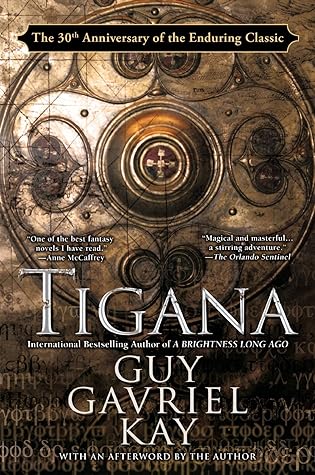More on this book
Community
Kindle Notes & Highlights
He’d embraced both children, and then he’d held his wife for a long time, in silence; all the words had been spoken many times through all the years.
Vidomni’s waxing matches Ilarion’s wane. The two moons together would make one whole.” “A strange whole that would be,” Saevar said. “’Tis a strange night.”
Looking up at the blackened crossbeams of the ceiling he briefly contemplated hanging himself from one of them: by the heels of course. For old time’s sake.
“Two: music trains the mind, like mathematics, or logic, to precision of detail. The sort of precision, my lords, that would have precluded the carelessness that has marked tonight.
Devin doubted if he’d ever seen a man so obviously happy to be where he was. It must have shown in the amused irony of his glance, for Rovigo, catching the look, shrugged. “Daughters,” he lamented, sorrowfully shaking his head.
“Dear heart,” he said, in a voice far removed from the raillery of before, “you have a lesson to learn. Our friends make music for their livelihood. They are our guests here tonight. One does not, light of my life, ask guests to work in one’s home.”
“We make music to live, indeed, but we also make music because doing so is most truly to live. It is not work to play among friends, Rovigo.”
“Forgive me, both of you. I should not have asked. I have opened a wound.” “I was the one who asked,” Devin said quickly. “The wound is always open,”
A part of Tomasso, a corner of his heart, seemed to be knitting itself slowly back together, even though this was only a dream, only his own longing. A last feeble fantasy of being loved before they flayed him.
Will you hear me if I tell you I have been proud of you, in my fashion?”
And in that moment Dianora had a truth brought home to her with finality: how something can seem quite unchanged in all the small surface details of existence where things never really change, men and women being what they are, but how the core, the pulse, the kernel of everything can still have become utterly unlike what it had been before.
It was genuinely disconcerting how easily Brandin could sound the depths of things. If she allowed herself to dwell on that she could become frightened again.
She watched. To share it. To bear witness and remember, knowing even then that such things were going to matter, if anything mattered in the days and years to come.
A song for Erlein di Senzio, cloaked in bitterness and the shadows of night by the riverbank alone. I will not say I am sorry, Alessan had told the wizard as the sun had set. But I can tell you that I grieve. And that night, listening to the music the Prince of Tigana made upon his pipes, Devin learned the difference between the two. He watched Alessan, and then he watched the others as they looked at the Prince, and it was when he was gazing at Baerd that the need to weep did grow too strong. His own griefs rose to the call of the mountain pipes. Grief for Alessan and overmastered Erlein. For
...more
They had opened his shirt and turned up the sleeves, revealing angry weals where he had writhed against the ropes in his struggle to be free. Or is that backwards, Devin thought grimly. Wasn’t the binding of the rope his real struggle to be free?
Her father stormed about the house in the awkward manner of a man unused to raging,
looked at the two of them and he couldn’t have said which man he admired more in that moment. The one who had asked, knowing what he asked, or the one who had given, knowing what he gave. He had an awareness though, humbling, inescapable, of how far yet he had to travel—a distance he might never traverse—before he could name himself a man after the fashion of these two.
Who wanted to be rooted in the soil of Brandin’s hate?
He liked when necessity and gain came together; it didn’t happen often but when it did the marriage seemed to Alberico of Barbadior to represent almost the purest pleasure to be found in power.
Words were power, words tried to change you, to shape bridges of longing that no one could ever really cross.
Both men are aware of what is at stake: when you want to subjugate a people—to erase their sense of themselves as separate and distinctive—one place to start (and it is sometimes enough) is with their language and names.
Names link to history, and we need a sense of our history to define ourselves.
I hoped to explore, as part of the revolt the book would chronicle, the idea of the evils done by good men, to stretch the reader with ambiguities and divided loyalties in a genre that tended (and still tends) not to work that way.


